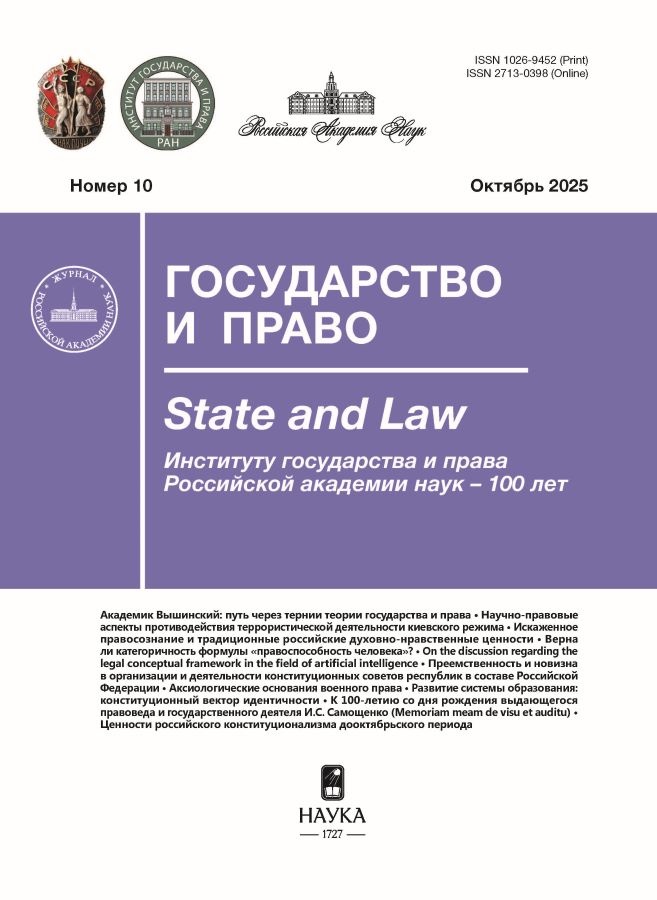The effective functioning of the tripartism system is an important factor in the sustainable development of modern society
- Authors: Wang Y.1, Vasilevich G.A.2, Liu X.1
-
Affiliations:
- Shanghai University of Political Science and Law
- Belarusian State University
- Issue: No 10 (2025)
- Pages: 60-69
- Section: Comparative law
- URL: https://freezetech.ru/1026-9452/article/view/693380
- DOI: https://doi.org/10.31857/S1026945225100041
- ID: 693380
Cite item
Abstract
The article is devoted to the analysis of legislation, conventions and recommendations of the International Labour Organization, as well as doctrinal sources concerning the development of social partnership in the Russian Federation, the People’s Republic of China, and the Republic of Belarus. The role of the state, trade unions and entrepreneurs in ensuring the sustainable development of society and the state is reflected. It was emphasized that in developing social partnership, states are guided by the achieved level of socio-economic development and future prospects.
About the authors
Yuan Wang
Shanghai University of Political Science and Law
Author for correspondence.
Email: wangyuanbsu@163.com
7989 Wai Qing Song Road, Shanghai, P. R. China
G. A. Vasilevich
Belarusian State University
Email: Gregory5581@yamdex.by
4 Nezavisimosti Ave., 220030 Minsk, Belarus
Xian Liu
Shanghai University of Political Science and Law
Email: 1964347670@qq.com
7989 Wai Qing Song Road, Shanghai, P. R. China
References
- Averin A. Social partnership and its main types // Social policy and social partnership. 2011. No. 3. P. 37 (in Russ.).
- Velikanov A. P. Principles of state participation in the system of tripartism // Theory and practice of social development. 2012. No. 10 (in Russ.).
- Delegeoz E. G. Tripartism as a policy of active partnership // Socio-economic and humanitarian Journal of the Krasnoyarsk State Agrarian University. 2018. No. 2. P. 71 (in Russ.).
- Komarovsky V., Sadovskaya E. Employers’ associations in the social partnership system: the experience of developed countries and Russia. M., 2010. Pp. 52, 70 (in Russ.).
- Martynov P. Trade unions in China: functions and responsibilities. URL: https://chinalogist.ru/articles/profsoyuzy-v-kitae-funkcii-i-obyazannosti-22071 (in Russ.).
- Model I. M., Model B. S. Social partnership under federalism // Polis. 2000. No. 2. Pp. 172–177 (in Russ.).
- Osipov E. M. Features of the formation of social partnership in modern Russia // Sociology of Power. 2010. No. 2. Pp. 190–195 (in Russ.).
- Peregudov S. P. Tripartist institutions in the West and in Russia: problems of renewal // POLIS. 2007. No. 3. Pp. 78–90 (in Russ.).
- Radchenko A. N. Categorical and theoretical aspects of studying the phenomenon of tripartism in modern Russia // Scientific thought of the Caucasus. 2012. No. 2. Pp. 35, 36 (in Russ.).
- Sychenko E. V. Labor Law of foreign countries. M., 2023 (in Russ.).
- Shi Sh. China’s Human Development Index and Economic Growth: a retrospective analysis and a global perspective // The economy of the region. 2024. Vol. 20. No. 1. Pp. 76–91 (in Russ.).
- Shipitko A. B. Modern models of partnership in the social and labor sphere // Izvestiya of the Saratov University. Vol. 13. Ser.: Sociology. Political science. 2013. Iss. 1. P. 36 (in Russ.).
- Shmakov M. The system of tripartism: one hundred years of efforts to increase predictability and predictability in social and labor relations. URL: https://www.lihachev.ru/pic/site/files/lihcht/2019/dokladi/SHmakovMV_plen_rus_izd.pdf?ysclid=magpfllro0433650258 (accessed: 05.10.2025) (in Russ.).
- Yang Zhe. Socio-economic aspects of the activities of the trade unions of the USSR and Russia in the mirror of Chinese historiography // Economic history. 2013. No. 2 (21). Pp. 47–53 (in Russ.).
- Wu Wenfang. The path of the rule of law in China for the participation of employers’ organizations in the tripartite mechanism // Journal of Wenzhou University (Social Science Edition). 2024. Vol. 37. No. 5.
Supplementary files










